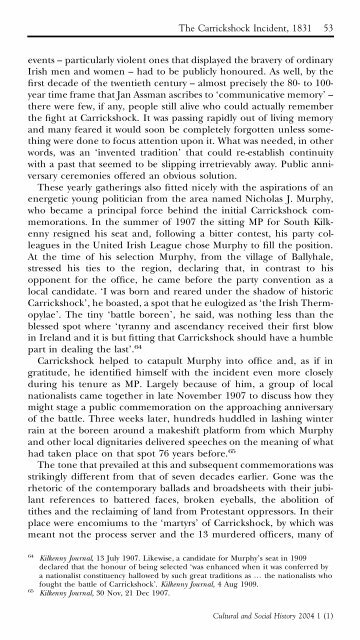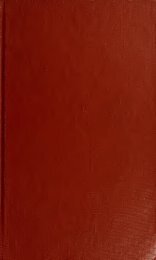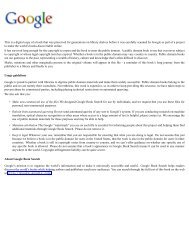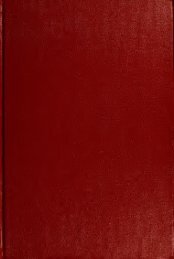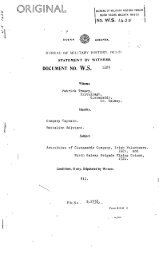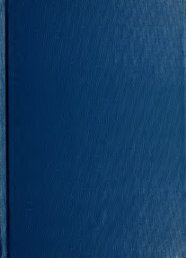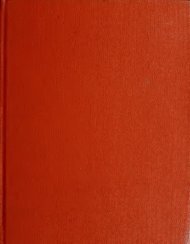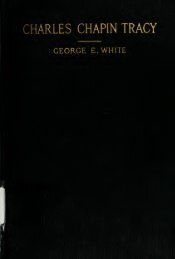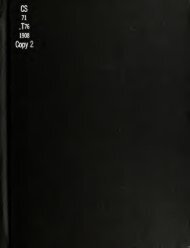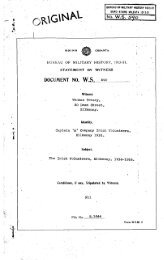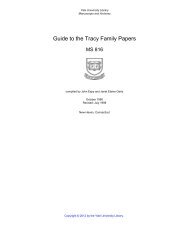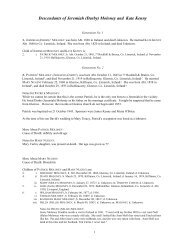The Carrickshock Incident, 1831: Social Memory and an Irish cause ...
The Carrickshock Incident, 1831: Social Memory and an Irish cause ...
The Carrickshock Incident, 1831: Social Memory and an Irish cause ...
You also want an ePaper? Increase the reach of your titles
YUMPU automatically turns print PDFs into web optimized ePapers that Google loves.
<strong>The</strong> <strong>Carrickshock</strong> <strong>Incident</strong>, <strong>1831</strong> 53<br />
events – particularly violent ones that displayed the bravery of ordinary<br />
<strong>Irish</strong> men <strong><strong>an</strong>d</strong> women – had to be publicly honoured. As well, by the<br />
rst decade of the twentieth century – almost precisely the 80- to 100year<br />
time frame that J<strong>an</strong> Assm<strong>an</strong> ascribes to ‘communicative memory’ –<br />
there were few, if <strong>an</strong>y, people still alive who could actually remember<br />
the ght at <strong>Carrickshock</strong>. It was passing rapidly out of living memory<br />
<strong><strong>an</strong>d</strong> m<strong>an</strong>y feared it would soon be completely forgotten unless something<br />
were done to focus attention upon it. What was needed, in other<br />
words, was <strong>an</strong> ‘invented tradition’ that could re-establish continuity<br />
with a past that seemed to be slipping irretrievably away. Public <strong>an</strong>niversary<br />
ceremonies offered <strong>an</strong> obvious solution.<br />
<strong>The</strong>se yearly gatherings also tted nicely with the aspirations of <strong>an</strong><br />
energetic young politici<strong>an</strong> from the area named Nicholas J. Murphy,<br />
who became a principal force behind the initial <strong>Carrickshock</strong> commemorations.<br />
In the summer of 1907 the sitting MP for South Kilkenny<br />
resigned his seat <strong><strong>an</strong>d</strong>, following a bitter contest, his party colleagues<br />
in the United <strong>Irish</strong> League chose Murphy to ll the position.<br />
At the time of his selection Murphy, from the village of Ballyhale,<br />
stressed his ties to the region, declaring that, in contrast to his<br />
opponent for the of ce, he came before the party convention as a<br />
local c<strong><strong>an</strong>d</strong>idate. ‘I was born <strong><strong>an</strong>d</strong> reared under the shadow of historic<br />
<strong>Carrickshock</strong>’, he boasted, a spot that he eulogized as ‘the <strong>Irish</strong> <strong>The</strong>rmopylae’.<br />
<strong>The</strong> tiny ‘battle boreen’, he said, was nothing less th<strong>an</strong> the<br />
blessed spot where ‘tyr<strong>an</strong>ny <strong><strong>an</strong>d</strong> ascend<strong>an</strong>cy received their rst blow<br />
in Irel<strong><strong>an</strong>d</strong> <strong><strong>an</strong>d</strong> it is but tting that <strong>Carrickshock</strong> should have a humble<br />
part in dealing the last’. 64<br />
<strong>Carrickshock</strong> helped to catapult Murphy into of ce <strong><strong>an</strong>d</strong>, as if in<br />
gratitude, he identi ed himself with the incident even more closely<br />
during his tenure as MP. Largely be<strong>cause</strong> of him, a group of local<br />
nationalists came together in late November 1907 to discuss how they<br />
might stage a public commemoration on the approaching <strong>an</strong>niversary<br />
of the battle. Three weeks later, hundreds huddled in lashing winter<br />
rain at the boreen around a makeshift platform from which Murphy<br />
<strong><strong>an</strong>d</strong> other local dignitaries delivered speeches on the me<strong>an</strong>ing of what<br />
had taken place on that spot 76 years before. 65<br />
<strong>The</strong> tone that prevailed at this <strong><strong>an</strong>d</strong> subsequent commemorations was<br />
strikingly different from that of seven decades earlier. Gone was the<br />
rhetoric of the contemporary ballads <strong><strong>an</strong>d</strong> broadsheets with their jubil<strong>an</strong>t<br />
references to battered faces, broken eyeballs, the abolition of<br />
tithes <strong><strong>an</strong>d</strong> the reclaiming of l<strong><strong>an</strong>d</strong> from Protest<strong>an</strong>t oppressors. In their<br />
place were encomiums to the ‘martyrs’ of <strong>Carrickshock</strong>, by which was<br />
me<strong>an</strong>t not the process server <strong><strong>an</strong>d</strong> the 13 murdered of cers, m<strong>an</strong>y of<br />
64 Kilkenny Journal, 13 July 1907. Likewise, a c<strong><strong>an</strong>d</strong>idate for Murphy’s seat in 1909<br />
declared that the honour of being selected ‘was enh<strong>an</strong>ced when it was conferred by<br />
a nationalist constituency hallowed by such great traditions as % the nationalists who<br />
fought the battle of <strong>Carrickshock</strong>’. Kilkenny Journal, 4 Aug 1909.<br />
65 Kilkenny Journal, 30 Nov, 21 Dec 1907.<br />
Cultural <strong><strong>an</strong>d</strong> <strong>Social</strong> History 2004 1 (1)


